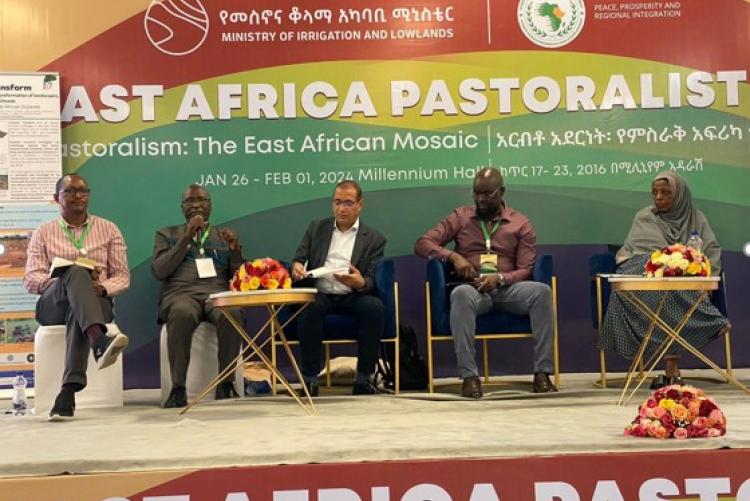The SLU-led Dryland Transform Research Project organised a panel discussion titled ‘Ecosystem restoration for feed, food and nutrition resilience in East African drylands’, during the East Africa Pastoralist Expo in Addis Ababa, Ethiopia 26th Jan – 2nd Feb 2024. Dryland Transform was represented by the Kenya and Uganda Country Co-ordinators, Dr. Stephen Mureithi and Prof. Denis Mpairwe, respectively.
Intergovernmental Authority on Development (IGAD) together with The Ministry of Irrigation and Lowlands, Ethiopia organised the First EAST AFRICA PASTORALISM EXPO which was held January 26- February 1, 2024 at the Millennium Hall, Addis Ababa, Ethiopia. At the EXPO, the Swedish FORMAS funded Dryland Transform Research Project conducted a panel discussion titled ‘Rangeland restoration for feed, food and nutrition resilience in East African Drylands’.
The Moderator of the Panel Discussion was Dr. Dominic Kathiya Lokeris, Livestock and Rangeland Development Expert, IGAD
The Panelists were:
- Dr Stephen Mureithi, Rangeland Restoration Ecology and Management, University of Nairobi
- Professor Denis Mpairwe, Animal Scientist & Range Ecologist, Makerere University
- Ms Sadia Muse Ahmed, Country Director, Oastoral & Environmental Network in the Horn of Africa (PENHA)
- Mr Aderajaw Molla, Ministry of Agriculture, Ethiopia
- Professor Ahmed R. Elbeltagy, Animal Production, Natural Resource Management and Resilience, African Union, INTERAFRICAN Bureau for Animal Resources (AUIBAR)
The objectives of the panel discussion were:
- To create awareness on the need to enhance ecosystem restoration for feed, food and nutrition resilience in the Eastern African drylands
- Identify synergies and trade-offs in the provision of ecosystem services in the East African drylands
- Share results from the DT research undertook to assess land health at the landscape scale and explore the links with human health and well-being.
- Show how co-developing sustainable rangeland management interventions through setting-up knowledge sharing hubs (‘livestock cafés’) offers option for pastoral communities adapting technologies restoration of degraded pastoral rangelands and also serve as co-learning and knowledge exchange centres
- Engage with policymakers and restoration practitioners and provide robust science-based evidence and tools to support and guide rangeland restoration efforts at scale
- Log in to post comments

